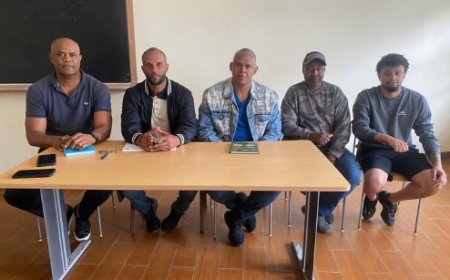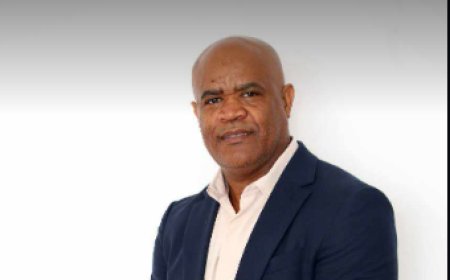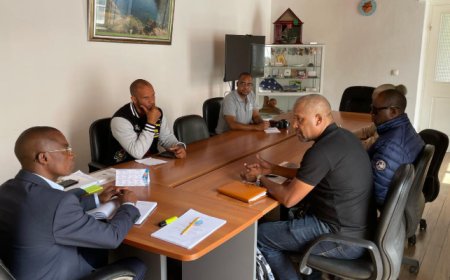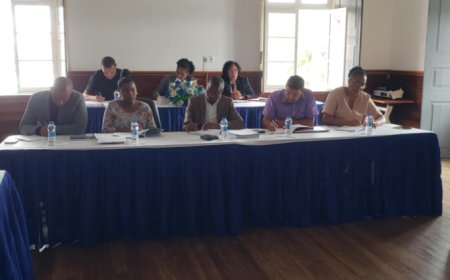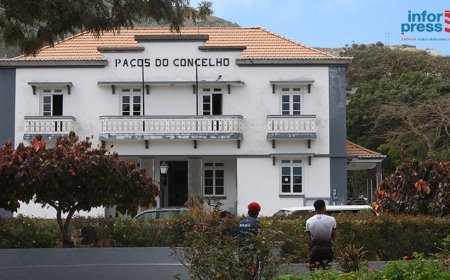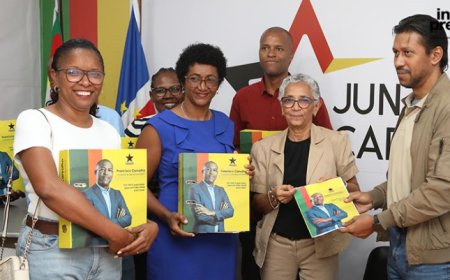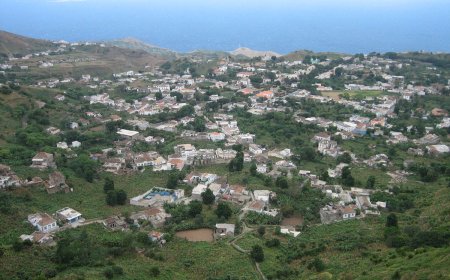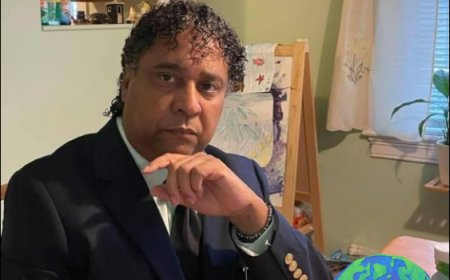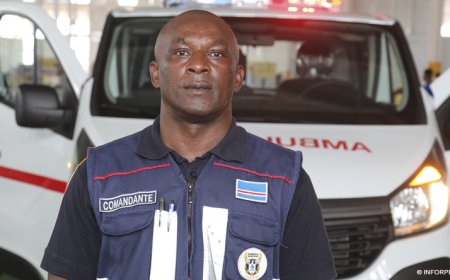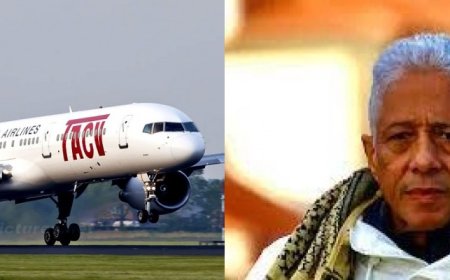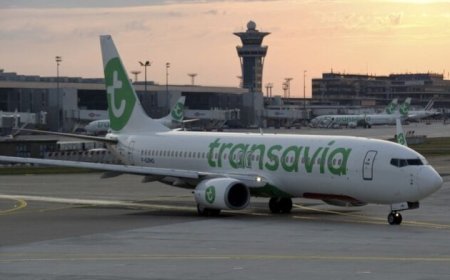TACV case returns to the spotlight: Américo Medina warns about the silence of the authorities in the face of the company's insolvency and inability to fulfill its commitments
In a post that he has just published on his Facebook page, Américo Faria Medina returns to the load on TACV, focusing on the silence of the authorities in the face of the company's insolvency and inability to fulfill its commitments. "In the current context of insolvency and inability to fulfill its commitments, TACV has been reducing the volume of training, the rigor of procedures and processes, updates, maintenance, acquisition of parts, systems, etc., not complying with the minimum established for the safety of operations, as the pilots themselves publicly and frontally denounced. bankrupt companies must be inhibited from operating due to the various risks they represent for the sector and correlated businesses (financial, commercial risks, operational security)". Medina warns that the situation is serious, defending that "the authorities must speak the truth" to Cape Verdeans. "The situation is serious and the authorities must tell us the truth, so that we know how far we are with this colossal failure, this mess, which is also Homeric! It is an obligation, a moral duty of AAC, TACV and the state shareholder who have to clarify the country, the taxpayers", he stresses in the mentioned post that we publish below.
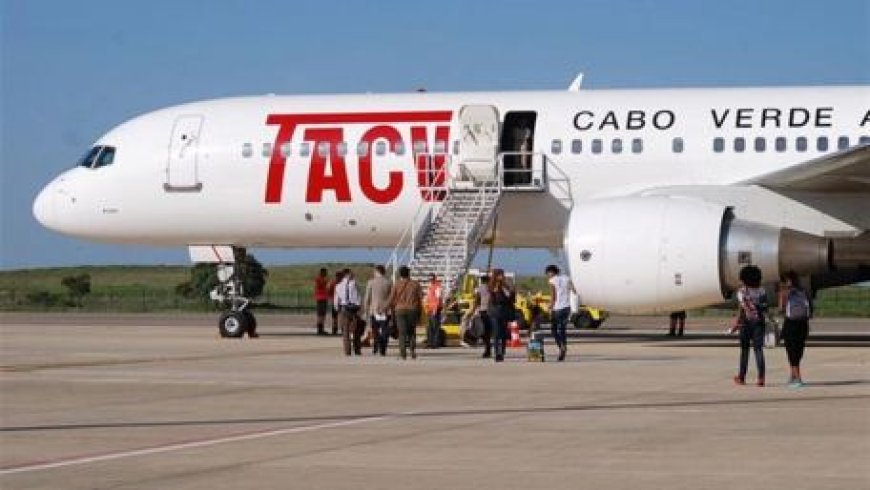
In a post that he has just published on his Facebook page, Américo Faria Medina returns to the load on TACV, focusing on the silence of the authorities in the face of the company's insolvency and inability to fulfill its commitments. " In the current context of insolvency and inability to fulfill its commitments, TACV has been reducing the volume of training, the rigor of procedures and processes, updates, maintenance, acquisition of parts, systems, etc., not complying with the minimum established for the safety of operations, as the pilots themselves publicly and frontally denounced. bankrupt companies must be prevented from operating due to the various risks they represent for the sector and related businesses (financial, commercial risks, operational security) ". Medina warns that the situation is serious, defending that " the authorities must speak the truth " to Cape Verdeans. " The situation is serious and the authorities must tell us the truth, so that we know how far we are with this colossal failure, this mess, which is also Homeric! It is an obligation, a moral duty of AAC, TACV and the state shareholder who have to clarify the country, the taxpayers ", stresses in the aforementioned post that we publish below.
But what silence is this?!
After the initial delirium, a continuation of the monumental and vertiginous boasting, the olés and shouts of the turnips and “tolerated” strippers of the net, in what seemed to be a bullfighting show from the provincial bacoco...(!), lately this gloomy silence of the rulers , managers and organized cheerleaders of hooligans disguised as economics gurus, is indeed very intriguing! It even becomes intimidating, given the magnitude of what was, is and will be at stake, the enormity of the values that each taxpayer is called to place in that bottomless bag of our perdition, and all the charanga that was produced around each passenger transported, or landing of this or that aircraft!
All this, once again, with regard to TACV, since it has become evident that the rulers and managers intend to extend a mantle of silence over this epic and calamitous personal disaster for the UCS, which is the restructuring and privatization of that company...
In the alternation verified in 2016, the new government led by UCS, as the then candidate had done during the campaign, made a lot of publicity around its options to increase the mobility of Cape Verdeans, both internally (maritime and air transport) or in our ability to come and go abroad.
The UCS (Ulisses Correia e Silva) assured us that the frequencies of air carriers would be greater, the options more flexible, the routes would be diversified, covering the four continents, travel would be cheaper; we were assured that, from 2017/18, Sal would be a hub-stopover processing more than 7,000,000 passengers/year, an unavoidable stopover in the Middle Atlantic, a reference in air transport in the African region; by the authorized voice of Ti Gôy Gonçalves (forever in our hearts) we were assured that Santo Antão would have a medium-sized international airport (later larger than those existing in Sal, Boavista and São Vicente, which are small) and that the international night flights would become possible on Boavista and SV, domestic night flights on Fogo Island.
It is evident that, after these seven (7!) years, what we actually have in air transport is a handful of setbacks and disappointments in our mobility, frequencies, reliability, serious pathologies in the sector, with occurrences, numbers, ratios, performance wandering the streets of bitterness.
After these years, there are several fiascoes around TACV, with the operator's bewilderment visible, whose Board of Directors and guardianship have proved incapable of restructuring the company as promised (the Board's mandate ends in three months) and incapable of to comply with financial commitments, obligations and requirements of a technical-operational nature which, if not met, should dictate the suspension of operations by the competent authority (AAC); an operator unable to control costs, much less productivity, while we see competition increasing its market share and dictating the rules of the game, which, combined with other factors, contribute to putting unsustainable pressure on TACV's balance sheets.
It should be noted that we are in a situation where the international agencies that regulate the sector point to a shortage of spare parts in the market due to the sanctions against Russia, allied to the redundancies of existing systems in the companies (60% of the titanium that is used in engines and parts come from Russia)
Well, therefore, it is axiomatic that marginal and bankrupt microcompanies like TACV are under pressure and inability to fulfill, among many obligations, the standard maintenance programs! Since aviation is predominantly a cash business, the exorbitant prices of parts, their scarcity, the high operating costs (fuels and petroleum derivatives), corporate bewilderment, leave TACV in a bottleneck and pit of apprehensions and incurable defaults that the the public, the common taxpayer and even politicians at the highest level (at the highest level) because of the prevailing aeronautical “illiteracy”, normally do not notice it.
In the current context of insolvency and inability to fulfill its commitments, TACV has been reducing the volume of training, the rigor of procedures and processes, updates, maintenance, acquisition of parts, systems, etc., not complying with the established minimums for the safety of operations, as the pilots themselves publicly and frontally denounced. It is necessary to note and remember that studies carried out in the industry conclude that the profitability of airlines is directly correlated with their safety. Bankrupt companies must be prohibited from operating due to the various risks they represent for the sector and correlated businesses (financial, commercial, operational security risks).
The situation is serious, and the authorities must tell us the truth, so that we know how far we are with this colossal failure, this mess, which is also Homeric! It is an obligation, a moral duty of AAC, TACV and the state shareholder who have to clarify the country, the taxpayers.
If we were apprehensive, we were terrified when colleagues from other latitudes and very well positioned, have just informed us that TACV will be negotiating and almost concluding the acquisition of two Boeing 737-MAX 8... adequate fleet! One aircraft immediately, the other within a maximum of 12 months after the arrival of the first (there is a brutal penalty in case of withdrawal of the second). The AAC, reportedly, was placed on the sidelines of this process.
Issues that must be resolved
Well, once again we focus on a type of aircraft (similar to the infamous Plan “B” for maritime transport of our renowned “Beyoncê” de Barbas), without taking into account other dimensions of the business and planning, as well as assumptions that, if not met and equated, there will be no fleet that can resist, otherwise let’s see:
- a) TACV does not have an ETOPS certificate, does not have a FAR 129 certificate and due to various non-compliance with service providers, airports and US authorities (TSA, Boston and Providence airports) American users (refunds) cannot fly to the States; from 2019 to 2021 he flew to the USA with ICELANDAIR as a Sponsor, if he has to do it now he will have to settle all the debts and make a deposit corresponding to one year of operations; ETOPS certification (even an accelerated certification) for the 737-MAX 8 will not be possible before six months of operations after purchase
- b) TACV has lost its IOSA certificate and in order to recover it, it will have to go through an initial certification process again;
- c) TACV continues to be banned from IATA, it has outstanding debts in ITALY, FRANCE, BRAZIL (to mention the most relevant ones), situations that must be regularized since their regularization is pending the reputation and capacity of the company to operate without risk of seizure for these destinations. These debts have to be lean, guarantee smooth operations, no agency in Europe sells TACV due to debts and bad reputation;
- d) The company does not have sales channels at the height (without scope or depth) to compete in the market, which is evident when looking to buy TACV flights in Europe, USA, Brazil; just point out that with one aircraft the operator is only working 130 hours/month, not managing to fill 04 flights/week between Lisbon and CV; the B737-MAX will each have to do 300 hours/month (600 in total)... - I repeat we are at 130 hours/month, with one aircraft. Will these aircraft get there with these prevailing commercial, technical and operational limitations? With that same leadership as there and prevailing corporate bewilderment? It should be noted that managers passed by and arrived at 400hrs by plane;
- e) The operator is at risk of not seeing its AOC renewed for a period longer than six months (years ago TACV was already able to do so for 24 months); in 2018 the company renewed the AOC for a period of 18 months, in 2019 it renewed for 24 months, going back to 12 months in 2022 due to non-compliance and various non-conformities, running the risk of the aircraft being “grounded” by the AAC, since deadlines for correcting these non-conformities are systematically exceeded (eg, equipment that is part of the aircraft, were exchanged in Luanda, without observing the standard procedures provided for this purpose, the corresponding documentation was not delivered);
- f) The company has been operating for more than 04 months without what EASA, ICAO and other international agencies and regulators in the sector call the "Post Holder" for the Quality and Operational Safety System, that is the auditor-manager of the entire related to the compliance of the organization's system for these sensitive and vital areas of any airline, paramount in air transport, “Safety First/Safety Is a Paramount”! This is a serious non-compliance;
- g) Risk analyzes in certain situations that are norms/obligations in the industry, for example to support certain management decisions, fleet changes, change of Post Holders have not been carried out; the Flight Data Monitoring Program is managed by the Training Director, which constitutes a conflict of interest and lack of transparency in the analysis of said data, weakening the risk identification and mitigation process.
TCO-EASA Certification Case and AAC's Role
We are all well aware of the spectacle that was the imbroglio related to the TCO-EASA Certification of last July, the costs of suspending operations, the inconvenience caused to passengers, the costs of resorting to the market to replace flights with another aircraft; of the decision of the MT, Dr Carlos Santos, after losing face in front of the public, to order an urgent investigation to establish responsibilities..., what were the results?
Well, worrying news has also reached us that report from government officials who, given the operator's difficulties in complying with its obligations and regulations with the competent authority, decided to give a "little help", interceding for the regulated with the regulator.
The AAC should not be lenient with the operator's non-compliance, as air transport is not carried out on a razor's edge. Nor be tempted to cover operations when they are not solidly supported by good procedures, best practices and duly audited systems.
The situation is serious, and the authorities must tell us the truth, so that we know how far we are with this colossal failure, this mess, which is also Homeric! It is an obligation, a moral duty of AAC, TACV and the government that have to clarify the country, the taxpayers.
But after all, what silence is this?!
Américo Faria Medina
..






